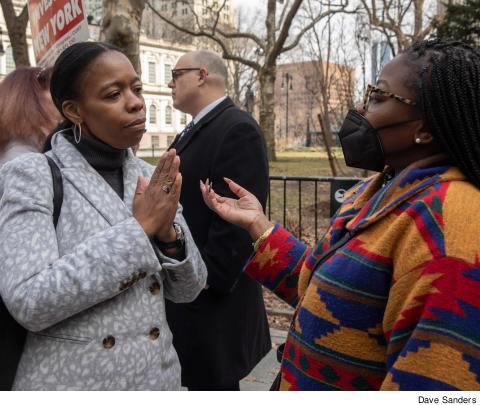Council focuses on CUNY remedial programs
 |
The New York City Department of Education (DOE) and CUNY should work more closely together to ensure that the city’s graduating seniors are best prepared for college, city council members said at a February 25 Committee on Higher Education hearing. (See Council support for ND4C.) PSC leaders argued that the university has gradually diminished remedial programs for both CUNY students and the PSC members who teach in these programs.
“Remediation programs, such as CUNY Start and the CUNY Language Immersion Program (CLIP), are essential to students’ ability to gain the vital skills to succeed in college and to graduate,” said PSC President James Davis in a written testimony submitted to the committee. Davis added that a 2018 study by CUNY showed that “the number of students who need remediation is significant. Approximately 80% of New York City public high school graduates enter CUNY’s community colleges in need of remediation.”
COVID CHANGES
Davis, who also spoke at the hearing, noted that the pandemic has surely increased this need.
“Every semester, CUNY welcomes new students with high school diplomas or the equivalent who lack some of the academic skills needed to succeed in credit-bearing college classes. For students with major remedial needs, CUNY has established pre-matriculation programs that provide full-time academic support and immersive skills development curricula,” Davis said. “Over time the process by which students are placed in programs has changed, shifting students away from a more rigorous academic experience to a lesser one. Additionally, in the past, our members who taught these courses were full-time faculty and now, many are part-time continuing education teachers, paid hourly or on a contract basis. This shift exacerbates wage disparities at the university and deprofessionalizes the work, which is unfair to students and our members.”
The union has worked to address the deprofessionalization of certain PSC titles. In the 2010–2017 PSC-CUNY contract agreement, ratified in the summer of 2016, many CUNY CLIP and CUNY Start instructors were converted from part-time workers to full-time instructors, Clarion reported in March 2017. But some titles within these programs remain part-time, explained Faye Moore, the union’s director of contract enforcement.
Lorraine Cohen, professor of sociology at LaGuardia Community College, told the council members that CUNY is shifting more students who require language and skills development into continuing education programs, noting in her submitted testimony that “this policy is conveniently cheaper than paying full-time faculty and adjuncts from the credit-bearing academic departments.”
“Continuing Education Teachers, many of whom are part-time, are paid much less than academic faculty and have fewer benefits and less job security,” she said. “This is yet another example of exploiting the part-time labor force.”
A SMOOTH TRANSITION
PSC Treasurer Felicia Wharton, who has also taught math at the Brooklyn Educational Opportunity Center to students working on attaining their high school diplomas, told the panel, “There is no one-size-fits-all technique to assist underprepared students to succeed. As the population of learners changes, we have to be innovative with new approaches to make a difference.”
City Council members at the hearing agreed that the DOE and CUNY should work more closely together to help the city’s graduating seniors make a smoother transition into college life and academics at CUNY. Some members even envisioned a system that would be more integrated, like a K–16 system. In fact, the new chair of the Committee on Higher Education, Eric Dinowitz, a former DOE teacher and a United Federation of Teachers activist, told Clarion in February that he didn’t view elementary and college education as siloed, but rather envisioned “a continuum of support and services.”
NEEDED PIPELINE
“There has to be a pipeline,” said Rita Joseph, the chair of the Council’s Committee on Education. We need to work together to make sure that K–12 and higher education has a connection [and] that there is no disconnect.”
Joseph said that students who attend New York City public schools and go on to CUNY “should not be spending most of their time taking remedial classes if we’re doing our part from the DOE end,” because “they should be able to accelerate, succeed and move on to the next level.”
“It should not take seven years to get an associate’s degree,” Joseph said. “There should never be a disconnect between education and higher education and even youth services. All those programs should go hand-in-hand.”
“There are significant needs for robust support in the CUNY system,” Dinowitz said, adding that a more holistic approach with the DOE and CUNY working closely together would recognize “that CUNY does not exist in isolation.”
Shomial Ahmad contributed to the reporting of this story.

